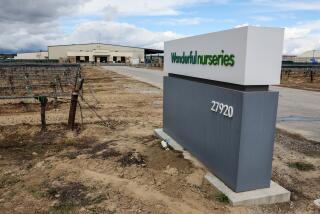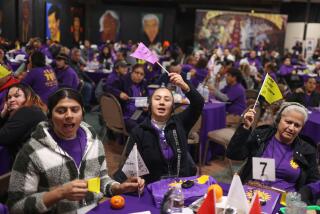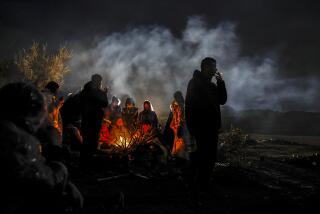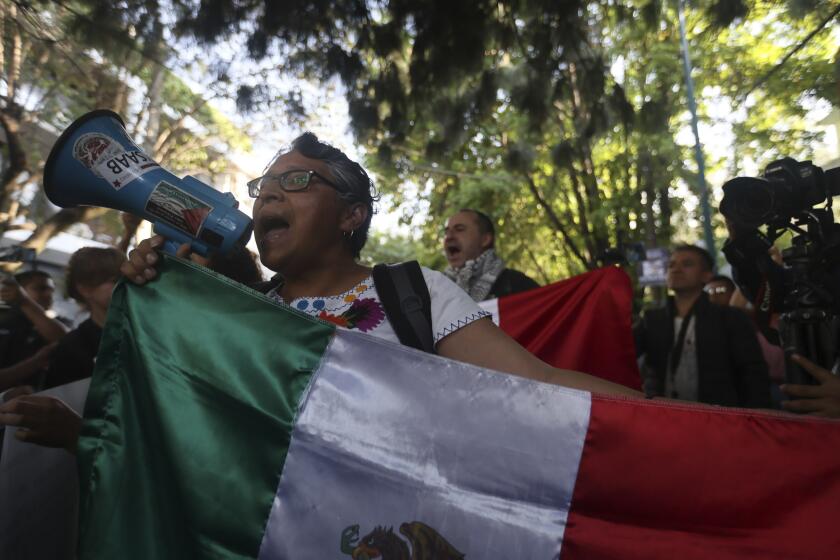Baja labor leaders learned tactics from their efforts in U.S.
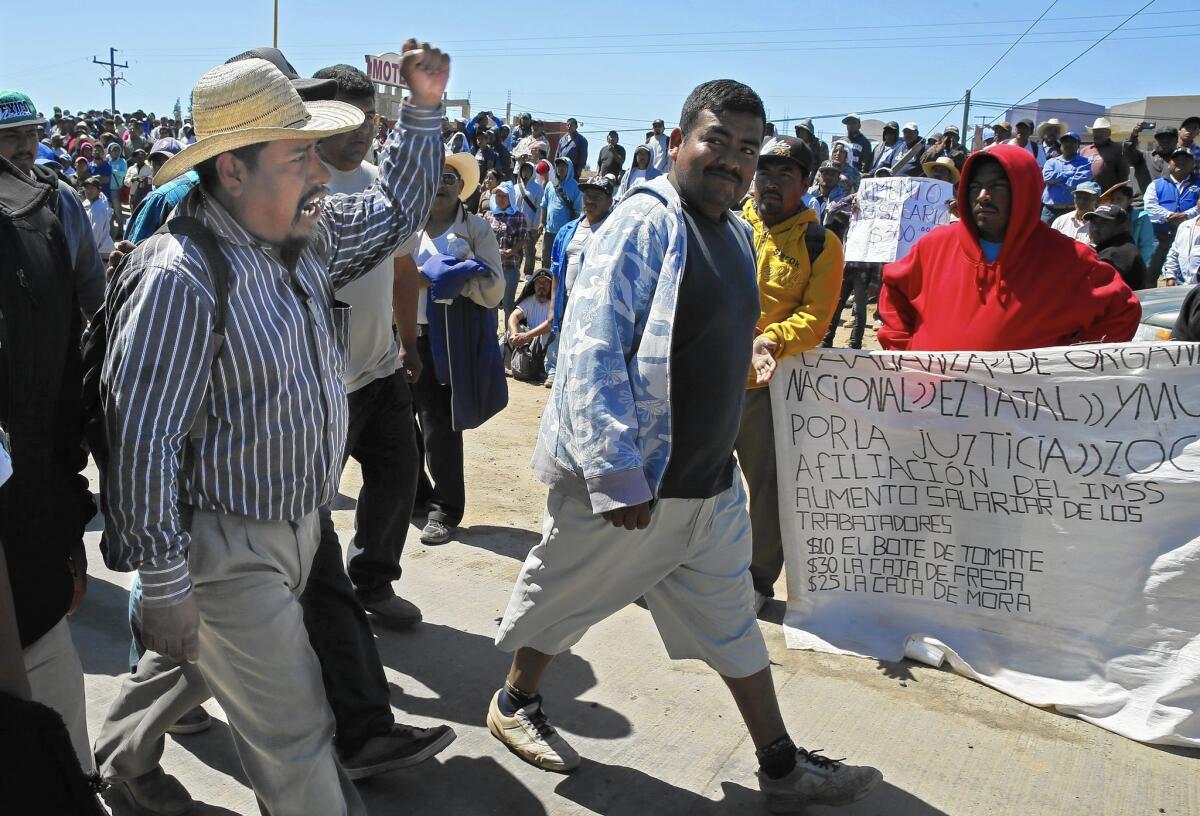
Before Fidel Sanchez led protest marches this month against growers in Baja California, he fought for higher wages from tomato farmers in Florida.
Justino Herrera, who dons an Army fatigue jacket during labor talks, once led a work stoppage against an abusive labor contractor in Oregon.
Eloy Fernandez said he draws from his union organizing experience in California to keep angry protesters in San Quintin from resorting to violence.
“People get rowdy, but we don’t want that,” Fernandez, who helps run a makeshift camp of striking laborers outside a government building, said Thursday. “We just want to show our presence. To show the government that we are raising our voices. That’s how we did it over there.”
Sanchez, Herrera and Fernandez play important roles in the labor movement that has mobilized thousands of workers to strike at the peak of the late-winter harvest in this coastal region 200 miles south of San Diego.
The walkout, in its second week, has crippled the state’s agricultural export economy, leaving crops to rot while talks between labor leaders and industry groups stall over worker demands. Workers want higher wages and accuse agribusinesses of sexual harassment and denial of government benefits, accusations that the growers deny.
Another undercurrent of discontent driving the strikers stems from their shared experiences working in American agricultural fields, where many saw firsthand the slow but steady gains in worker conditions resulting from organized labor movements.
In Mexico, farmworker strikes of this scale and duration are rare. The walkout began March 17 and is the first in decades in Baja California. For many it’s no coincidence that it has taken place in a region so close to the United States.
For decades, workers here migrated annually north of the border, following the tomato and grape harvests up the West Coast. But fortified border security largely stopped the migration.
By the end of the last decade, tens of thousands of laborers had settled permanently in and around the hub of San Quintin. Mostly indigenous people from the southern Mexican state of Oaxaca, locals jokingly call the area “Oaxa-California.”
After years living in the U.S. they were less tolerant of deteriorating social conditions in Mexico. Once fragmented along ethnic lines reflecting different indigenous groups — Mixteco, Triqui, Zapoteco — they united to demand better water and garbage service, then started pressing labor demands late last year.
“They came back from the U.S. with different ideas,” said Gabriel Neri, a local radio talk show host who thinks the American experience has been a key inspiration for labor leaders, especially the younger ones. “It gave them a different perspective.”
And influenced their tactics.
Fidel Sanchez, 44, a gruff, goateed father of six, has threatened to use a boycott strategy that led to landmark labor reforms in Florida. The Coalition of Immokalee Workers, a union in which Sanchez took part as a negotiator in the late 1990s, has succeeded in pressuring major retailers such as Walmart to improve wages and conditions at its supplier farms.
Sanchez at a recent meeting told government officials and an industry representative that if negotiations failed he would start pressuring major American buyers of the berries, tomatoes and cucumbers exported from the area.
The United Farm Workers of America — another U.S. union with which Sanchez participated in protests, during the few years he worked picking apples in Washington — said it has already gathered 20,000 signatures on a petition in support of Baja laborers. It plans to give it to U.S. supermarket chains such as Walmart, Kroger and Safeway.
“I don’t have educational experience. I don’t have an intellectual background. All I have is my education from life experiences, learning from others. Cesar Chavez was an example I learned from, that we shouldn’t live submissively,” Sanchez said.
Greg Asbed, co-founder of the Immokalee union, expressed pride that his organization had helped shape Sanchez’s leadership role.
“The consciousness and commitment that Fidel developed in his time with the CIW in Immokalee clearly was not lost,” Asbed said, “but rather remained kindled in him and found expression in his leadership of the movement there in Baja today in a world where the need for change is dire.”
Not everyone is praising the leaders’ tactics. They were criticized after early protests degenerated into running battles with police. Some people took over government buildings and blocked the main highway linking the region with export markets.
Leaders said that the unrest was caused by rogue groups and that, since the melee, there has been more discipline managing demonstrations, which have been peaceful and haven’t blocked the highway.
Controlling protesters has been difficult, leaders acknowledge. But they blame the tense situation on growers, who for years have blocked labor reforms. Retaliation against outspoken laborers, they say, has been common, with people blacklisted, threatened and worse.
Sanchez lives in a village named after a union organizer, Maclovio Rojas, who died after being run over by a car in the late 1980s. Herrera’s brother was found shot dead in 1998. Explanations for the deaths vary. Some locals say that the Rojas crash was an accident and that Herrera’s brother took his own life. But laborers, who suspect both men were murdered, consider them labor movement martyrs.
Herrera, 61, said agribusinesses stopped hiring him years ago because of his organizing activities. Growers he encountered in the U.S., he said, were more amenable to worker demands. The Oregon farmer against whom he led a one-day work stoppage got rid of the labor contractor that workers had accused of wage theft, he said.
The wealthy, politically powerful agribusiness owners in Baja California, he said, don’t budge so easily. “They’re too Mexican. Too macho. They don’t want to be seen giving in to people they consider beneath them,” he said. “They think we’re animals.”
Growers and their defenders have rejected the accusations, saying farmworker wages in Baja California — about $7 to $10 a day — are among the highest in Mexico. On Friday, an attorney representing local growers proposed a wage increase of 15%, which was rejected by labor leaders who are seeking a daily wage of 200 pesos (about $13).
Baja California Gov. Francisco Vega de Lamadrid, in a news conference Friday, defended the industry, saying that wages already are high in San Quintin and that a salary boost would only draw more migrants to the area.
The Agricultural Council of Baja California, an association of growers, did not respond to requests for comment. (The council is part of a national alliance of produce industry groups formed after The Times published “Product of Mexico,” a series documenting labor abuses at Mexican export farms.)
BerryMex, a U.S.-owned company whose berries are shipped under the Driscoll’s label, announced Friday that it was boosting its daily minimum wage by 20% and enhancing its benefits package.
Fernandez, 65, said he preaches nonviolence at the protest camp where he helps feed and supply laborers who man the spot as a show of solidarity.
The logistical role suits him, Fernandez said, because he worked as a union coordinator for the UFW in California’s Imperial Valley in the late 1970s. Fernandez said his job was to rally laborers and make sure they had enough water and food to sustain prolonged protests.
Supplies are much scarcer in Baja, where there has been little to no outside support. Fernandez, his hair tousled and face stubbled, after six days of going without a shower, said the camp was running short on water, tortillas and diapers.
After crowds of hundreds dwindled at the shelter as negotiations stalled without major progress, Fernandez worried that some people would have to return to the fields so they wouldn’t starve.
Whatever happens, Fernandez said, the strike has served to show people the power of solidarity and that they could break the stereotypical image of indigenous people as meek.
“We’re not the Indian lying against a nopal cactus sleeping with the hat over his head,” Fernandez said. “We want to be heard.”
Twitter: @ricardin24
Read The Times’ investigation: Product of Mexico
More to Read
Start your day right
Sign up for Essential California for news, features and recommendations from the L.A. Times and beyond in your inbox six days a week.
You may occasionally receive promotional content from the Los Angeles Times.
